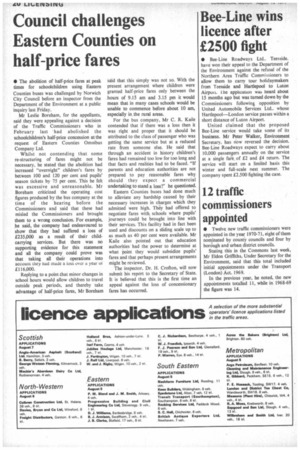Council challenges Eastern Counties on half-price fares
Page 22

If you've noticed an error in this article please click here to report it so we can fix it.
• The abolition of half-price fares at peak tunes for schoolchildren using Eastern Counties buses was challenged by Norwich City Council before an inspector from the Department of the Environment at a public inquiry last Friday.
Mr Leslie Boreham, for the appellants, said they were appealing against a decision of the Traffic Commissioners who in February last had abolished the schoolchildren's half-price concession at the request of Eastern Counties Omnibus Company Ltd.
Whilst not contending that some re-structuring of fares might not be necessary, he stated that the abolition had increased "overnight" children's fares by between 100 and 120 per cent and pupils' season tickets by 75 per cent. This he felt was excessive and unreasonable. Mr Boreham criticized the operating cost figures produced by the bus company at the time of the hearing before the Commissioners and said that these had misled the Commissioners and brought them to a wrong conclusion. For example, he said, the company had endeavoured to show that they had suffered a loss of £235,000 as a result of their childcarrying services. But there was no supporting evidence for this statement and all the company could prove was that taking all their operations into account they had made a loss over a year 01 £116,000.
Replying to a point That minor changes in school hours would allow children to travel outside peak periods, and thereby take advantage of half-price fares, Mr Boreham
said that this simply was not so. With the present arrangement where children were granted half-price fares only between the hours of 9.15 am and 3.15 pm it would mean that in many cases schools would be unable to commence before about 10 am, especially in the rural areas.
For the bus company, Mr C. R. Kaile contended that if there was a loss then it was right and proper that it should be attributed to the class of passenger who was getting the same service but at a reduced rate from someone else. He said that through an accident in history children's fares had remained too low for too long and that facts and realities had to be faced. "If parents and education authorities are not prepared to pay reasonable fares why should they expect a commercial undertaking to stand a loss?" he questioned.
Eastern Counties buses had done much to alleviate any hardship caused by their necessary increases in charges which they admitted were high. They had offered to negotiate fares with. schools where pupils' journeys could be brought into line with their services. This facility had in fact been used and discounts on a sliding scale up to as much as 40 per cent were available. Mr Kaile also pointed out that education authorities had the power to determine at what Point they would subsidize pupils' fares and that perhaps present arrangements might be reviewed.
The inspector, Dr. H. Crofton, will now submit his report to the Secretary of State. It is believed that this is the first time an appeal against the loss of concessionary fares has occurred.




















































































